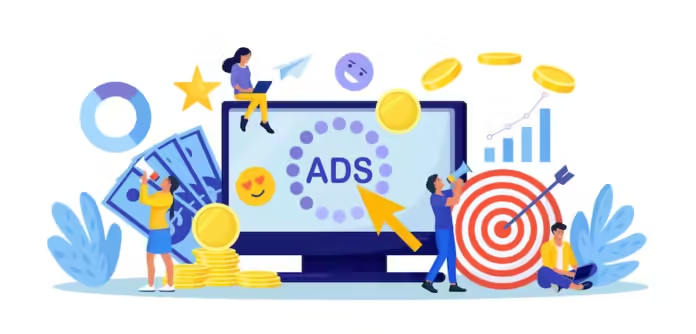PPC (pay-per-click) marketing is a type of online advertising in which marketers earn charges when users click on their ads. Advertisers bid based on what they think is the worth of a click relative to the keywords, platforms, and audience type from which it came. Paid search advertising and PPC management can be extremely efficient forms of digital marketing. Companies can achieve great success by using effective pay per click strategies. PPC is all about relevance. Users are always searching for specific products, services, and information. Advertisers have the power to display a targeted ad at the same moment this search occurs. This ultimate guide to PPC in digital marketing has some of the best PPC marketing strategies.
PPC Terms and Definitions
If you plan to enter the paid advertising arena, you should be familiar with a few words. Below, we go over the essential components of a PPC campaign, from broad to specialised.
Search engine marketing (SEM)
The goal of all forms of digital advertising is to rank for a specific keyword, which you can do in a variety of methods. Search Engine Marketing (SEM) refers to any paid or unpaid digital marketing done using a search engine such as Google, Yahoo, or Bing. SEM is an umbrella phrase that refers to both paid advertising and search engine optimisation (SEO), which is the organic ranking of keywords.
The cost-per-click (CPC) is the amount an advertiser pays for each click on your ad. CPC serves as your bid in an auction to determine where your ad will be shown. As you may expect, a greater bid leads to better ad placement.
You set your CPC to the highest price you are ready to pay for each click on your advertisement. The following formula determines how much you actually pay.
(Competitor’s Ad Rank / Your Quality Score) + 0.01 equals Actual CPC.
Let’s go over the terms in this equation so you can understand what you’re paying for.
Ad Rank
This value influences where an ad appears on the search engine results page. It equals Maximum Bid x Quality Score.
Quality Score
This is the score that search engines assign to your ad based on your clickthrough rate (CTR), which is compared against the average CTR of advertisements in that position, the relevancy of your keywords, the quality of your landing page, and your previous performance on the SERPs.
Maximum Bid
This is the maximum amount you are willing to spend for each click on your ad.
You can set your CPC to manual, which means you set the maximum bid for your advertisements, or enhanced, which allows search engines to change your bid based on your objectives. One of these upgraded choices is bid strategies, which automatically alter your offers based on clicks or conversions.
Best PPC Platforms
Now that you understand the fundamentals of PPC, your next question is surely, “Where should I advertise?”
There are dozens of online venues where you may spend your hard-earned ad dollars, and the best way to assess them is to carefully consider your prospective ROI on each site. The most popular advertising platforms are successful because they are simple to use and, more importantly, heavily trafficked. However, if you have a limited budget, you may want to look into a lesser-known alternative to these major players. When selecting a platform, other factors to consider include the availability of keyword terms, where your target audience spends their time, and your marketing budget.
Here is a list of the best PPC platforms.
Google Ads
Google processes around 99,000 search requests every second on average, providing you with several opportunities to target terms that would entice your target audience to click. The disadvantage is that keywords are quite competitive on this platform, causing a higher ad expense.
Bing Ads
Bing is the second largest search engine, thus it makes sense that it has an advertising programme. Did you know that branded queries account for 61% of all Bing searches? If you establish a PPC campaign on Bing targeting certain keywords relating to your brand, your advertising are more likely to be viewed by the target audience.
Facebook Ads
Facebook Ads is a popular and effective paid ad platform (more usually used as CPM than CPC), owing to its unique targeting capabilities. Facebook lets you target individuals based on their interests, geographic location, and behaviours. Facebook supports native advertising, which is inserted and mixed into the social stream. It’s crucial to understand that the average CPC for a Facebook ad is $1.72. Keep that in mind as you select your PPC platform.
AdRoll
AdRoll is a retargeting tool that advertises to people who have previously visited your site. According to AdRoll’s 2024 State of Digital Marketing Report, the average organisation promotes across six channels. If someone reads your article about cheesemaking. You can retarget them on other platforms with display ads for your online cookery classes. While Google Ads allows for retargeting, the advantage of using AdRoll is that it can display ads on both Google and social networking sites, giving you more opportunity to collect clicks or impressions, depending on your aim.
RevContent
RevContent focuses on promoting content via PPC. It has the same impact as a guest post, in that your content is shown on an external site, but it takes the shape of a native ad. And, given that 21% of customers intend to abandon social media, native ads on external platforms may be worth considering. You can still bid on keywords with RevContent, and your advertisement will appear alongside relevant content. With our platform, you’ll profit from inexpensive CPCs and great engagement rates.
Pay-per-click (PPC) is a sort of advertising in which you pay a charge to have your website appear on the search engine result page (SERP) when someone enters specified keywords or phrases into the search engine. The SERP will display the advertising you produce to direct visitors to your website, and the charge you pay is determined by how many people click on your ad. This was your ultimate guide to PPC in digital marketing.





